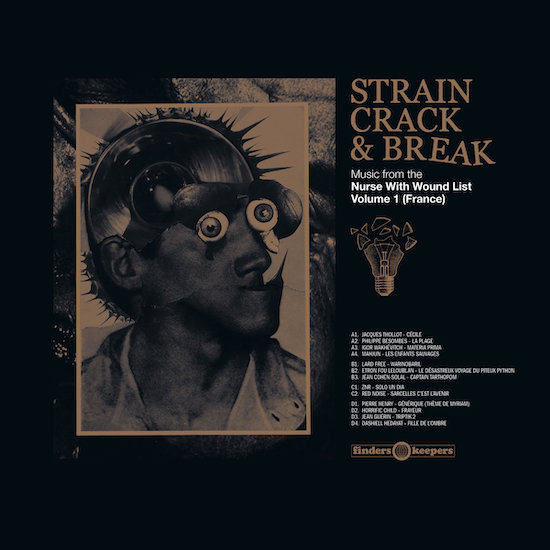Strain Crack and Break Volume One (France) chronicles the renowned list of obscure acts Nurse With Wound noted down on their legendary 1979 debut. It is a timely record, as recently there has been a growing interest in the French underground of the 1960s and 1970s. The volume, released on Finders Keepers and with the active collaboration of NWW’s Steven Stapleton, will only add further critical sheen, and doubtless be a gateway record to many.
Though less visible nowadays, the scene was certainly known at the time. We can point to the two volumes Dominique Grimaud dedicated to this lively and curious music that in the main emerged after May 68, Un certain rock (?) français (1977-8). And – like Krautrock or the Italian underground scenes – France’s post 1968 underground music has always had a following, however hidden.
For those about to dip their toes into this French sonic sea for the first time, there are welcome echoes of more familiar soundsmiths. When listening to a track like Mahjun’s epic ‘Les Enfants Sauvages’, I kept thinking of Gong’s Didier Malherbe (it’s the sax, of course). Faust’s Jean Hervé Peron came to mind, too, with Z. N. R.’s ‘Solo Un Dia’, a beautifully maudlin track which could be off Faust IV. And am I hearing things when I am reminded of side 2 of Kraftwerk’s debut whilst enjoying the edit of Red Noises’s punishing ‘Sarcelles C’Est L’Avenir’? (Well, during the bit before it jumps off a free-rock cliff…)
One thing is worth noting: Strain Crack and Break Volume 1 is an awfully long listen. The record is certainly conducive to getting in a high state to, but not for flicking through on your streaming platform of choice. You really have to give the release your attention and then go back and give it some more. It’s a release full of very groovy, but often intense music, getting high off its own sense of mission. There are some fabulous cuts to get lost in, such as the edit of Igor Wakhévitch’s piece, ‘Materia Prima’ (from his must-have Docteur Faust LP), a menacing space rock plod driven by bubbling synths that then turns tail and wades into Tago Mago territory. Sadly the cut means we don’t get the space-rock opera bits, but then it’s still a great appetiser. The great Philippe Besombes is here too, with a moody reflection from his 1975 LP Libra. ‘La Plage’ (The Beach) is the soundtrack to the most uninviting beach you can imagine and not at all like the rumbustious compositions he made with Jean-Louis Rizet. Rather it feels like a sonic prompt to those arty post-punks waiting just around the corner. In a similar vein is drummer Gilbert Artman’s outfit, (the tragically named) Lard Free. This ensemble weigh in with the menacing and sneaky groove entitled ‘Warinobaril’; a prime slice of anti-rock driven by some superbly concentrated blowing from saxophonist Philippe Bolliet that has the listener reaching for their Les Rallizes Denudes LPs, just for some light relief. It’s a wonderfully concentrated piece that also invokes Pere Ubu and early Section 25 (they must have heard this).
Absurdist, avant-garde, or hyper-intellectual elements in European culture never really fitted in with Anglo-American pop music. The likes of Tiny Tim or Screaming Lord Sutch were treated as novelties, Monster Raving Loonies of rock more fit for camp cabaret or Gleemen roles on the periphery. And the attempt to invoke clear European alternatives to mainstream “Americanised” pop culture has often led to very dark places indeed. But there is a clear sense with Strain Crack and Break that many French cultural traditions were being deliberately ransacked for “new” sonic headspace. The love of the absurd, for example, is there right from the off; even if you wouldn’t immediately know it. The comparatively restful opener ‘Cécile’, by jazz drummer Jacques Thollot is taken from his debut LP, entitled Quand le son devient aigu, jeter les girafes à la mer (Google it). Some tracks can drive you to a state of mild distraction. Etron Fou Leloublan’s ‘Le Désastreux Voyage Du Piteux Python’ is very much street theatre in the style of the Fugs or Beefheart’s ‘Golden Birdies’, or an even dafter Witthüsser and Westrupp. Be warned, there are ten whole minutes of engaging nuttiness to get through. Note also that the name of the band roughly translates as "Crazy Shit TheWhiteWolf". I suspect fans of Jacques Berrocal, or those who have the fabulous Les Harry’s GGOTS LP will love it. At this point we should nod to Finders Keepers and NWW, who keep that sense of whimsy going and set the listener up beautifully with the beautiful title track from from free jazz flautist Jean Cohen Solal’s magnificent 1973 LP, ‘Captain Tarthopom’.
Despite its length the collection is a very intriguing listen throughout and adept at changing tempo and mood. We get engaging slices of musique concrète to calm us, like Pierre Henry’s spooky 1962 track, ‘Générique (Thème de Myriam)’ from the soundtrack for Henri Decoin’s film, Maléfices. Horrific Child’s ‘Freyeur’ is a joy; proto noughties EMO meeting Sensational Alex Harvey Band-style prog amidships before becoming to all intents and purposes a groovy field recording. The track sometimes sounds like an Eno-Lanois release on the E.G. label; the bone-shaking percussion setting up a whole host of theatrics along the way. As if that wasn’t enough we get the gloriously batty modernist space theme ‘Triptik 2’, by Jean Guérin, to bid us adieu.
A last thought. Whilst doing some pre-review background reading on the artists, I stumbled across this online comment: “The French underground is to the underground what the french fast food cuisine is to the great French cuisine. Tasteless and pretentious.” I humbly beg to differ. This release is a must-have.


